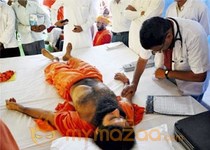After nine days of protest, Baba Ramdev Sunday finally ended his anti-graft fast, but vowed to pursue his campaign. The government and the ruling Congress launched a fresh round of attacks on the yoga guru, calling him a “dhongi” or fake and promised to expose his business empire.
Within hours of Ramdev sipping fruit juice at a hospital in Dehradun after frantic appeals from spiritual and political leaders, Congress general secretary B.K. Hariprasad dubbed him a fraud, while another general secretary Digvijay Singh called the fast a “nautanki” or drama.
Finance Minister Pranab Mukherjee, meanwhile, announced in Kolkata that the government would carry out a campaign to explain its position on the issue of corruption and the anti-graft Lokpal bill and attacked Ramdev and social activist Anna Hazare, saying they were undermining the country’s democratic institutions.
“He is a ‘dhongi (fake) baba’. He should tell people from where he got his Rs.1,100 crore,” Hariprasad said in Bangalore, referring to the financial empires Ramdev reportedly presides over.
Digvijay Singh, the most vocal critic of Ramdev in the Congress, demanded a probe into alleged money laundering by his trust. He also ruled out further talks with Ramdev on the corruption issue, claiming the government had already met most of his demands.
Speaking to reporters at Raja Bhoj airport in Bhopal, Singh said: “If he had kept a fast for some demands then he should not have broken it without its fulfilment. It was all a nautanki.”
Sri Sri Ravi Shankar, the Art of Living founders, was among those who played a key role in persuading the Haridwar-based yoga guru to give up his fast. Among others, who met Ramdev, were Punjab Chief Minister Prakash Singh Badal, former Haryana chief minister Om Prakash Chautala, Janata Party chief Subramaniam Swamy and religious leaders like Murari Bapu.
The 46-year-old Ramdev’s trusted aide, Acharaya Balkrishna, said though he ended the fast, the yoga guru would continue with his drive against mounting corruption and illegal money.
“I take this resolution to lead this ’satyagraha’ till the last breath of my life,” Balkrishna quoted Ramdev as saying. Balkrishna sought to underline that the anti-corruption campaign was not “against any party or person in particular”.
Ramdev, who began his fast in New Delhi on June 4, had continued his protest in Haridwar despite being forcibly evicted from the Ramlila Ground by Delhi police. When his condition worsened Friday he was rushed to a hospital in Dehradun.
Although doctors said Sunday that his condition was stable, he would not be discharged immediately.
In signs that the government was getting tired of the anti-corruption crusaders, Finance Minister Pranab Mukherjee alleged in Kolkata that civil society activists were undermining democratic institutions.
“The constitution has given the power to legislate only to parliament and the state assemblies. If 5,000 or 6,000 people dictate from outside, what parliament ought to do, this will weaken democracy,” Mukherjee said at a press conference.
Mukherjee said the BJP was behind the protests despite the party being rejected by the electorate in the recently concluded assembly elections.
Reacting sharply, BJP spokesperson Ravi Shankar Prasad said in New Delhi that the finance minister was trying to focus his anger on the opposition party and the RSS after he was criticised by the Congress for meeting Baba Ramdev at the Delhi airport on June 1.
“Pranab Babu…don’t talk the language of desperation. Being a seasoned politician, understand the mood, anger and distress of the people of the country over corruption,” he appealed to the finance minister.
While some saffron-clad Hindu religious leaders vowed to join hands in the anti-corruption campaign, Janata Party leader Subramanian Swamy described the Congress-led United Progressive Alliance (UPA) government as “monstrous” and said Ramdev’s fast was “successful”. “The fight against corruption will continue,” he said.
Congress leader Shakeel Ahmad too attacked the BJP and Rashtriya Swayamsevak Sangh (RSS), saying they “must be sad and wondering why Baba did not perish as they would have gained huge political mileage out of the issue”.







